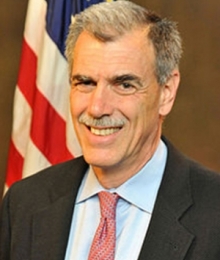S. Political Theory and the 1st Amendment
Course Information
- Course Number
- L9328
- Curriculum Level
- Upperclass
- Areas of Study
- Constitutional Law, Legal History and Law and Philosophy
- Type
- Seminar
- Additional Attributes
- LLM NY Bar Exam Qualifier, Tutorial Seminar
Section 001 Information
Instructor
 Vincent Blasi
Corliss Lamont Professor Emeritus of Civil Liberties
Vincent Blasi
Corliss Lamont Professor Emeritus of Civil Liberties
 Donald B. Verrilli
Lecturer in Law
Donald B. Verrilli
Lecturer in Law
Section Description
The seminar will be conducted on the assumption that students bring to it from their previous course on the First Amendment a basic familiarity with the most prominent doctrines and theories regarding the freedom of speech.
We will proceed in three stages.
First, we will review how at the birth of the modern First Amendment (ca. 1917-27) the landmark judicial opinions by Learned Hand, Oliver Wendell Holmes, and Louis Brandeis attempted to reconcile robust protection against laws punishing speech with the principle of majority rule. Then we will study how the philosopher Alexander Meiklejohn maintained during the McCarthy Era that the principle of freedom of speech actually derives from the constitutional commitment to democratic self-government. For perspective, we will compare how the political function of the freedom of speech was understood by leading thinkers in three earlier eras (ancient Athens, seventeenth-century England, and 1790s America). To conclude the first stage of the seminar, we will examine how modern notions of personal autonomy introduce different reasons to value free speech. For this last inquiry, the work of John Stuart Mill will be explored with emphasis on its possible connection to recent autonomy arguments.
Second, we will devote six weeks of the seminar to a close study of twelve First Amendment opinions of the Roberts Court. We will read very lightly-edited versions of the opinions along with transcripts of the oral arguments in the cases under discussion. For each case discussion, one student will be assigned to defend every paragraph of the majority opinion against all criticisms advanced in the dissents or which the rest of us in the seminar can formulate. We will explore not only how persuasive are the Justices opinions but also what challenges were faced by the advocates in the cases and how well they met those challenges. (Note: two of the cases were argued by Professor Verrilli in his role as Solicitor General during the Obama Administration.)
Third, we will conclude the seminar by devoting the final three sessions to First Amendment issues that have come to prominence recently, many on account of dynamics introduced by changing technologies. For the most part, we will study these issues by reading innovative law review articles flagging problems and proposing ways to address them.
In addition to the assignment of defending a Supreme Court opinion orally, each student will be required to write a short paper (approximately 7 double-spaced pages) outlining and evaluating in detail the arguments within the Court in one of the cases we will discuss, and a second paper (approximately 10 double-spaced pages) critiquing an article that was assigned during either the first or third stage of the seminar.
Enrollment limited to 12 students. 8 students will be registered through the lottery. 4 additional students will be selected from the waitlist, with instructor permission - these students may have preparation relevant for the seminar other than the formal pre-requisite courses. Students wishing to request permission to take the course should email Professor Blasi: [email protected].
- School Year & Semester
- Spring 2024
- Location
- JGH 107
- Schedule
-
Class meets on
- Monday
- Points
- 3
- Method of Evaluation
- Paper
- J.D Writing Credit?
- Minor (upon consultation)
Learning Outcomes
- Primary
-
- Develop skills of close reading, critical evaluation, succinct exposition, and responsive discussion.
- Secondary
-
- Evaluate recent Supreme Court decisons interpreting the First Amendment.
Course Limitations
- Instructor Pre-requisites
- Basic course in American Constitutional Law and a course on the First Amendment (either L6229 Ideas of the 1st Amendment or L6407 Adv Con Law: First Amendment).
- Instructor Co-Requisites
- None
- Requires Permission
- No
- Recommended Courses
- None
- Other Limitations
- Enrollment is limited to 12 students - 6 by lottery; 6 by instructor permission LLMs: only two of the three course credits will count toward the 24 credit minimum for the NY Bar."